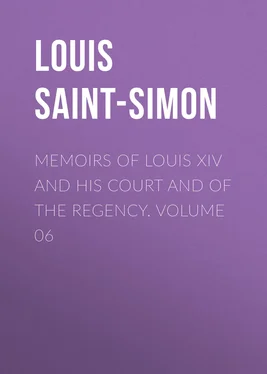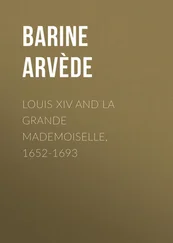Louis Saint-Simon - Memoirs of Louis XIV and His Court and of the Regency. Volume 06
Здесь есть возможность читать онлайн «Louis Saint-Simon - Memoirs of Louis XIV and His Court and of the Regency. Volume 06» — ознакомительный отрывок электронной книги совершенно бесплатно, а после прочтения отрывка купить полную версию. В некоторых случаях можно слушать аудио, скачать через торрент в формате fb2 и присутствует краткое содержание. Жанр: Биографии и Мемуары, История, foreign_edu, foreign_antique, foreign_prose, на английском языке. Описание произведения, (предисловие) а так же отзывы посетителей доступны на портале библиотеки ЛибКат.
- Название:Memoirs of Louis XIV and His Court and of the Regency. Volume 06
- Автор:
- Жанр:
- Год:неизвестен
- ISBN:нет данных
- Рейтинг книги:3 / 5. Голосов: 1
-
Избранное:Добавить в избранное
- Отзывы:
-
Ваша оценка:
- 60
- 1
- 2
- 3
- 4
- 5
Memoirs of Louis XIV and His Court and of the Regency. Volume 06: краткое содержание, описание и аннотация
Предлагаем к чтению аннотацию, описание, краткое содержание или предисловие (зависит от того, что написал сам автор книги «Memoirs of Louis XIV and His Court and of the Regency. Volume 06»). Если вы не нашли необходимую информацию о книге — напишите в комментариях, мы постараемся отыскать её.
Memoirs of Louis XIV and His Court and of the Regency. Volume 06 — читать онлайн ознакомительный отрывок
Ниже представлен текст книги, разбитый по страницам. Система сохранения места последней прочитанной страницы, позволяет с удобством читать онлайн бесплатно книгу «Memoirs of Louis XIV and His Court and of the Regency. Volume 06», без необходимости каждый раз заново искать на чём Вы остановились. Поставьте закладку, и сможете в любой момент перейти на страницу, на которой закончили чтение.
Интервал:
Закладка:
More and more troubled that the squadron did not appear, Rambure, after a time, turned back and went in search of it. As he approached the mouth of the river, which he had so lately entered, he heard a great noise of cannon out at sea, and a short time afterwards he saw many vessels of war there. Approaching more and more, and quitting the river, he distinguished our squadron, chased by twenty-six large ships of war and a number of other vessels, all of which he soon lost sight of, so much was our squadron in advance. He continued on his course in order to join them; but he could not do so until all had passed by the mouth of the river. Then steering clear of the rear-guard of the English ships, he remarked that the English fleet was hotly chasing the ship of the King of England, which ran along the coast, however, amid the fire of cannon and oftentimes of musketry. Rambure tried, for a long time, to profit by the lightness of his frigate to get ahead; but, always cut off by the enemy's vessels, and continually in danger of being taken, he returned to Dunkerque, where he immediately despatched to the Court this sad and disturbing news. He was followed, five or six days after, by the King of England, who returned to Dunkerque on the 7th of April, with his vessels badly knocked about.
It seems that the ship in which was the Prince, after experiencing the storm I have already alluded to, set sail again with its squadron, but twice got out of its reckoning within forty-eight hours; a fact not easy to understand in a voyage from Ostend to Edinburgh. This circumstance gave time to the English to join them; thereupon the King held a council, and much time was lost in deliberations. When the squadron drew near the river, the enemy was so close upon us, that to enter, without fighting either inside or out, seemed impossible. In this emergency it was suggested that our ships should go on to Inverness, about eighteen or twenty leagues further off. But this was objected to by Middleton and the Chevalier Forbin, who declared that the King of England was expected only at Edinburgh, and that it was useless to go elsewhere; and accordingly the project was given up, and the ships returned to France.
This return, however, was not accomplished without some difficulty. The enemy's fleet attacked the rear guard of ours, and after an obstinate combat, took two vessels of war and some other vessels. Among the prisoners made by the English were the Marquis de Levi, Lord Griffin, and the two sons of Middleton; who all, after suffering some little bad treatment, were conducted to London.
Lord Griffin was an old Englishman, who deserves a word of special mention. A firm Protestant, but much attached to the King of England, he knew nothing of this expedition until after the King's departure. He went immediately in quest of the Queen. With English freedom he reproached her for the little confidence she had had in him, in spite of his services and his constant fidelity, and finished by assuring her that neither his age nor his religion would hinder him from serving the King to the last drop of his blood. He spoke so feelingly that the Queen was ashamed. After this he went to Versailles, asked M. de Toulouse for a hundred Louis and a horse, and without delay rode off to Dunkerque, where he embarked with the others. In London he was condemned to death; but he showed so much firmness and such disdain of death, that his judges were too much ashamed to avow the execution to be carried out. The Queen sent him one respite, then another, although he had never asked for either, and finally he was allowed to remain at liberty in London on parole. He always received fresh respites, and lived in London as if it his own country, well received everywhere. Being informed that these respites would never cease, he lived thus several years, and died very old, a natural death. The other prisoners were equally well treated. It was in this expedition that the King of England first assumed the title of the Chevalier de Saint George, and that his enemies gave him that of the Pretender; both of which have remained to him. He showed much will and firmness, which he spoiled by a docility, the result of a bad education, austere and confined, that devotion, ill understood, together with the desire of maintaining him in fear and dependence, caused the Queen (who, with all her sanctity, always wished to dominate) to give him. He asked to serve in the next campaign in Flanders, and wished to go there at once, or remain near Dunkerque. Service was promised him, but he was made to return to Saint Germain. Hough, who had been made a peer of Ireland before starting, preceded him with the journals of the voyage, and that of Forbin, to whom the King gave a thousand crowns pension and ten thousand as a recompense.
The King of England arrived at Saint Germain on Friday, the 20th of April, and came with the Queen, the following Sunday, to Marly, where our King was. The two Kings embraced each other several times, in the presence of the two Courts. But the visit altogether was a sad one. The Courts, which met in the garden, returned towards the Chateau, exchanging indifferent words in an indifferent way.
Middleton was strongly suspected of having acquainted the English with our project. They acted, at all events, as if they had been informed of everything, and wished to appear to know nothing. They made a semblance of sending their fleet to escort a convoy to Portugal; they got in readiness the few troops they had in England and sent them towards Scotland; and the Queen, under various pretexts, detained in London, until the affair had failed, the Duke of Hamilton, the most powerful Scotch lord; and the life and soul of the expedition. When all was over, she made no arrests, and wisely avoided throwing Scotland into despair. This conduct much augmented her authority in England, attached all hearts to her, and took away all desire of stirring again by taking away all hope of success. Thus failed a project so well and so secretly conducted until the end, which was pitiable; and with this project failed that of the Low Countries, which was no longer thought of.
The allies uttered loud cries against this attempt on the part of a power they believed at its last gasp, and which, while pretending to seek peace, thought of nothing less than the invasion of Great Britain. The effect of our failure was to bind closer, and to irritate more and more this formidable alliance.
CHAPTER XL
Brissac, Major of the Body-guards, died of age and ennui about this time, more than eighty years old, at his country-house, to which he had not long retired. The King had made use of him to put the Guards upon that grand military footing they have reached. He had acquired the confidence of the King by his inexorable exactitude, his honesty, and his aptitude. He was a sort of wild boar, who had all the appearance of a bad man, without being so in reality; but his manners were, it must be admitted, harsh and disagreeable. The King, speaking one day of the majors of the troops, said that if they were good, they were sure to be hated.
"If it is necessary to be perfectly hated in order to be a good major," replied M. de Duras, who was behind the King with the baton, "behold, Sire, the best major in France!" and he took Brissac, all confusion, by the arm. The King laughed, though he would have thought such a sally very bad in any other; but M. de Duras had put himself on such a free footing, that he stopped at nothing before the King, and often said the sharpest things. This major had very robust health, and laughed at the doctors—very often, even before the King, at Fagon, whom nobody else would have dared to attack. Fagon replied by disdain, often by anger, and with all his wit was embarrassed. These short scenes were sometimes very amusing.
Brissac, a few years before his retirement, served the Court ladies a nice turn. All through the winter they attended evening prayers on Thursdays and Sundays, because the King went there; and, under the pretence of reading their prayer-books, had little tapers before them, which cast a light on their faces, and enabled the King to recognise them as he passed. On the evenings when they knew he would not go, scarcely one of them went. One evening, when the King was expected, all the ladies had arrived, and were in their places, and the guards were at their doors. Suddenly, Brissac appeared in the King's place, lifted his baton, and cried aloud, "Guards of the King, withdraw, return to your quarters; the King is not coming this evening." The guards withdrew; but after they had proceeded a short distance, were stopped by brigadiers posted for the purpose, and told to return in a few minutes. What Brissac had said was a joke. The ladies at once began to murmur one to another. In a moment or two all the candles were put out, and the ladies, with but few exceptions, left the chapel. Soon after the King arrived, and, much astonished to see so few ladies present, asked how it was that nobody was there. At the conclusion of the prayers Brissac related what he had done, not without dwelling on the piety of the Court ladies. The King and all who accompanied him laughed heartily. The story soon spread, and these ladies would have strangled Brissac if they had been able.
Читать дальшеИнтервал:
Закладка:
Похожие книги на «Memoirs of Louis XIV and His Court and of the Regency. Volume 06»
Представляем Вашему вниманию похожие книги на «Memoirs of Louis XIV and His Court and of the Regency. Volume 06» списком для выбора. Мы отобрали схожую по названию и смыслу литературу в надежде предоставить читателям больше вариантов отыскать новые, интересные, ещё непрочитанные произведения.
Обсуждение, отзывы о книге «Memoirs of Louis XIV and His Court and of the Regency. Volume 06» и просто собственные мнения читателей. Оставьте ваши комментарии, напишите, что Вы думаете о произведении, его смысле или главных героях. Укажите что конкретно понравилось, а что нет, и почему Вы так считаете.












